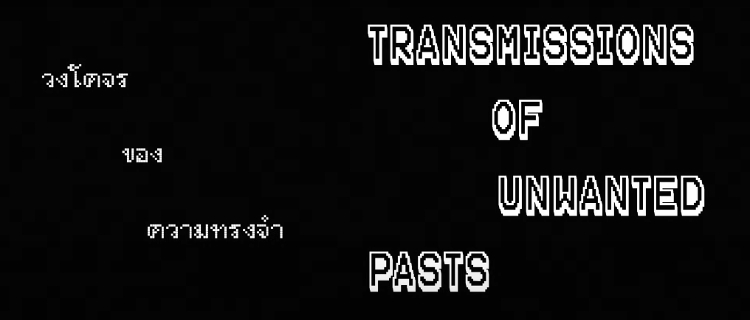
In Prabda Yoon’s short film Transmissions of Unwanted Pasts (วงโคจรของความทรงจำ), a satellite malfunctions and begins transmitting images that seem inexplicable until Pang, a young engineer, discovers that they represent “many important historical events in Thailand.” The mysterious images are never shown, though Pang lists the dates that they refer to: “2014, 2010, 2008, 1992, 1976, 1973, 1932...”
Of course, those are precisely the years that Thailand’s military would like us all to forget: the 2014 coup, the 2010 red-shirt crackdown, the 2008 police violence against yellow-shirt protesters, ‘Black May’ 1992, the 6th October 1976 and 14th October 1973 massacres, and the 1932 abolition of absolute monarchy. Pang excitedly suggests that historians could use the satellite data to study these events: “They might discover many new things, things that they were previously unaware of, or things that were never documented.” But her boss has other ideas, and three soldiers destroy all the material she’s gathered.
The science-fiction dystopia of Transmissions of Unwanted Pasts is, like the portmanteau film Ten Years Thailand and Thunska Pansittivorakul’s Supernatural (เหนือธรรมชาติ), also a comment on present-day Thailand. Like the soldiers erasing satellite images of ‘unwanted pasts’, Thailand’s successive military governments have sought to suppress discussion of these events. Bhandit Rittakol’s The Moonhunter (14 ตุลา สงครามประชาชน) describes the 1973 massacre as an event “that many would like to erase from history”.
The result of this whitewashing is a cycle of nascent democratic reforms repeatedly reset by military coups, as forgotten history is destined to repeat itself. In Prabda’s previous film, Someone from Nowhere (มา ณ ที่นี้), this cycle is symbolised by a violent argument between a condo owner and an interloper. The two figures represent military and civilian governments jostling for power, though their roles are later reversed, and they have no memory of their previous confrontation.
Of course, those are precisely the years that Thailand’s military would like us all to forget: the 2014 coup, the 2010 red-shirt crackdown, the 2008 police violence against yellow-shirt protesters, ‘Black May’ 1992, the 6th October 1976 and 14th October 1973 massacres, and the 1932 abolition of absolute monarchy. Pang excitedly suggests that historians could use the satellite data to study these events: “They might discover many new things, things that they were previously unaware of, or things that were never documented.” But her boss has other ideas, and three soldiers destroy all the material she’s gathered.
The science-fiction dystopia of Transmissions of Unwanted Pasts is, like the portmanteau film Ten Years Thailand and Thunska Pansittivorakul’s Supernatural (เหนือธรรมชาติ), also a comment on present-day Thailand. Like the soldiers erasing satellite images of ‘unwanted pasts’, Thailand’s successive military governments have sought to suppress discussion of these events. Bhandit Rittakol’s The Moonhunter (14 ตุลา สงครามประชาชน) describes the 1973 massacre as an event “that many would like to erase from history”.
The result of this whitewashing is a cycle of nascent democratic reforms repeatedly reset by military coups, as forgotten history is destined to repeat itself. In Prabda’s previous film, Someone from Nowhere (มา ณ ที่นี้), this cycle is symbolised by a violent argument between a condo owner and an interloper. The two figures represent military and civilian governments jostling for power, though their roles are later reversed, and they have no memory of their previous confrontation.

